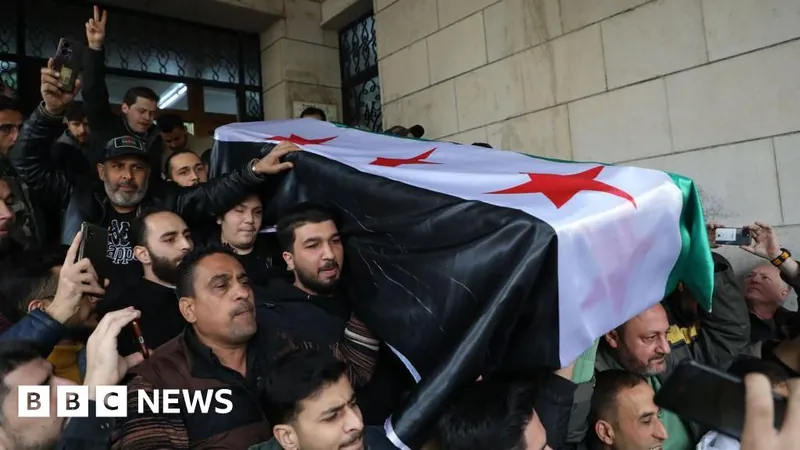
Grief Turns to Anger: Crowds Mourn Martyr While Seeking Justice in New Syria
2024-12-13
Author: Ting
Funeral Procession in Damascus
As thousands gathered in the streets of Damascus, waving the green, white, and black flag that has become synonymous with the Syrian uprising, they chanted, "We gave our blood and soul to the revolution." The funeral procession for Mazen Al-Hamada, an outspoken critic of Bashar Al-Assad's regime, transformed into a powerful display of unity and sorrow.
The Discovery of Mazen's Body
Mazen's body was found in the infamous Seydnaya prison, known as the "slaughterhouse," bearing the horrifying marks of torture. Witnesses described the scene as gruesome, with one doctor detailing fractures, burns, contusions, and a face that resembled a macabre puzzle of violence. His sister, Lamyaa, lamented, "It’s impossible to count the wounds on his body. His face was smashed, and his nose was broken."
A Life of Struggle and Pain
A former protester who joined the fight for freedom in 2011, Mazen was arrested and subjected to inhumane treatment. After emerging from captivity in 2013, he sought asylum in the Netherlands, where he began sharing his traumatic experiences, including horrific instances of sexual assault and persistent torture, as depicted in the documentary *Syria’s Disappeared*.
Mazen's Return to Syria
However, the psychological scars ran deep. Mazen's nephew revealed that he struggled with depression after his asylum experience and, under duress, returned to Syria in 2020, believing the government’s assurance of safe passage. Tragically, he was arrested upon his arrival, and many believe he was murdered shortly after the regime lost control of Hama.
Mourners Chant for Justice
As mourners chanted, "Mazen is a martyr," Lamyaa expressed her mixed feelings: "I am happy that we are free, but I wish he had lived to see it. He paid the price for our freedom."
The Opacity of Disappearances in Syria
Mazen's story is a harrowing reminder of the oppressive tactics employed by the Assad regime, which has led to over 100,000 disappearances, many thought dead. In makeshift morgues in Damascus, families sift through the remnants of their lost loved ones, grappling with the reality of their disappearance.
The Grief of Families
Reports reveal a chilling scene: as bodies piled up in hospital facilities, the stench of decay filled the air. Some families were forced to confront the unimaginable—a plastic bag containing human skulls, while others, like 19-year-old Ahmad Sultan Eid's mother, faced their worst fears when identifying their children’s remains.
Demands for Accountability
Desperation and loss echoed through the hospital; one grieving father lamented, "Living in a jungle was better than living in Syria." Outrage erupted as mothers empowered by their grief demanded justice, with one woman shouting, "Every mother searching for her son should get revenge against Assad. Putin should not shelter him; he should return to face us."
A Call for Justice
In the wake of the funeral, Lamyaa thoughtfully articulated the desire for justice: "The perpetrators of these crimes have all escaped, but I want them brought back to face a court of law."
A Nation’s Struggle for Healing
As Syria struggles to emerge from the dark legacy of its past, the grief, anger, and desire for justice continue to fuel the fight for a better future. Mazen Al-Hamada’s sacrifice will not be forgotten; his story echoes the countless others who suffered in silence. The world watches as Syrians demand accountability and healing in a nation torn apart by war.



 Brasil (PT)
Brasil (PT)
 Canada (EN)
Canada (EN)
 Chile (ES)
Chile (ES)
 España (ES)
España (ES)
 France (FR)
France (FR)
 Hong Kong (EN)
Hong Kong (EN)
 Italia (IT)
Italia (IT)
 日本 (JA)
日本 (JA)
 Magyarország (HU)
Magyarország (HU)
 Norge (NO)
Norge (NO)
 Polska (PL)
Polska (PL)
 Schweiz (DE)
Schweiz (DE)
 Singapore (EN)
Singapore (EN)
 Sverige (SV)
Sverige (SV)
 Suomi (FI)
Suomi (FI)
 Türkiye (TR)
Türkiye (TR)